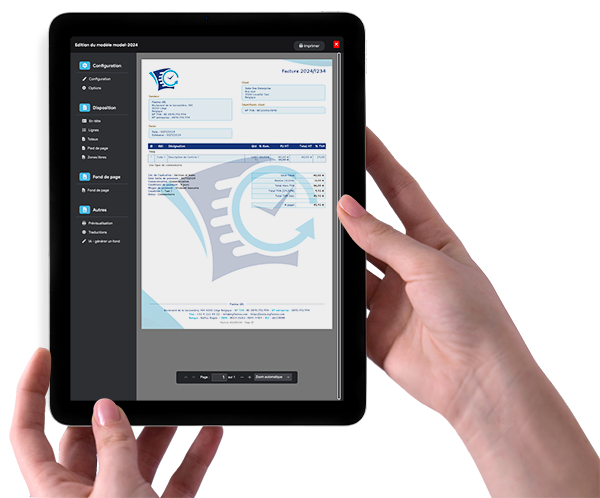Since January 1, 2026, electronic invoicing is now mandatory for business-to-business (B2B) invoicing in Belgium.
Good news: Flexina Invoicing software is ready for the mandatory electronic invoicing for B2B in Belgium. Since 2022, Flexina already allows you to register on the Peppol network and send your electronic invoices for B2G (administrations, public markets...) in Belgium and Luxembourg.
What are the differences between electronic invoicing, digital invoicing and paper invoicing?
Electronic invoicing
Electronic invoicing encompasses writing invoices in structured format (XML), optimized for automated reading by computers, thus facilitating advanced automation of processes related to invoicing, payment and accounting. These electronic invoices are routed through a secure network, such as the European PEPPOL network, recommended in Belgium.
Digital invoicing
Often confused with electronic invoicing, digital invoicing involves issuing invoices as PDF files. These digital invoices are then transmitted to the customer by email or made available via a download portal.
Paper invoicing
Paper invoicing (traditional) relies on issuing invoices printed on physical media and delivered by postal mail or hand delivery.
What are the advantages of using electronic invoicing for a small business?
Using electronic invoicing offers many advantages to small businesses:
Security and Traceability: Electronic invoices are sent and received securely, and their status is traceable. This avoids disputes with customers claiming not to have received the invoice, which can be common with paper or email invoicing.
Automatic Compliance: Electronic invoices must comply with strict formats and predefined management rules. This reduces the risk of the customer rejecting an invoice due to minor differences, such as rounding issues. Additionally, systems check compliance with each sending and receiving.
Simplification of Invoice Management: Electronic invoicing eliminates the need to manually search and file paper invoices. There's no longer a need to log into multiple portals to retrieve invoices in PDF format. Everything is centralized and accessible with a few clicks.
Accounting Automation: Electronic invoices can be automatically imported into accounting software, thus reducing manual entry. This saves time and reduces the risk of accounting errors.
Cost Savings: Using electronic invoicing reduces costs related to printing, postage and physical document storage. This can contribute to operational efficiency and expense optimization.
Sustainability: Electronic invoicing reduces paper consumption and contributes to reducing the company's carbon footprint, which is increasingly valued by customers and business partners.
More Efficient VAT Management: Electronic invoicing simplifies the collection and management of VAT data, which facilitates compliance with tax obligations and can reduce the risk of tax errors.
Reduction of Payment Delays: Electronic invoicing allows more accurate tracking of invoices, which can help reduce payment delays, thus improving the company's cash flow.
In summary, electronic invoicing presents multiple advantages for small businesses, particularly in terms of security, compliance, efficient invoice management and accounting automation, which can improve their operational efficiency and profitability.
Is it expensive to send an electronic invoice?
No, sending electronic invoices is very affordable, costing only a few cents. This is significantly more economical than sending invoices by post or registered mail.
Although sending invoices by email is sometimes considered cheaper, the considerable advantages of electronic invoicing, particularly in terms of security, traceability, error reduction, automated compliance and overall efficiency, largely justify this slight cost difference.
Thus, electronic invoicing represents a cost-effective solution for many businesses while significantly improving their invoicing process.
What is the link between the fight against VAT fraud and electronic invoicing, as mentioned by the minister in his statement?
The electronic transmission of invoice data, presented in a structured and computer-readable manner, is considered a potential means to fight against VAT fraud in the future. However, the statement does not provide specific details on this initiative, but it indicates that the FPS Finance plans an extensive information campaign.
As soon as additional information becomes available, we will be able to tell you more about this subject.
It should be noted that in many European countries, sending invoice data to tax authorities is becoming common practice, as in Italy, and soon in France. It is therefore conceivable that such an obligation will be implemented in Belgium in the coming years.
Should I already switch to electronic invoicing and register on the Peppol network?
If you have customers in administrations or the public sector in Belgium or Luxembourg, we recommend that you register on the Peppol network so you can send your invoices electronically because it's already mandatory in B2G.
If you only have B2B customers, it's now mandatory! Register now to receive invoices from your suppliers directly in the Flexina software without having to import them manually.
Summary of the article on mandatory electronic invoicing in Belgium since 2026
Electronic invoicing is now mandatory for B2B companies in Belgium since January 1, 2026. Flexina Invoicing presents itself as a ready solution to facilitate this transition, having already enabled the sending of electronic invoices in B2G since 2022.
The advantages of electronic invoicing, particularly for small businesses, are obvious: it offers more secure, efficient and economical invoice management, while promoting sustainable business practices.
Although the idea of using electronic transmission of invoice data to fight against VAT fraud is intriguing, concrete details remain to be clarified.
Overall, registration on the Peppol network is recommended, not only to comply with legal obligations for B2G, but also to enjoy the benefits of electronic invoicing now and in the future.
The transition to electronic invoicing appears to be an inevitable evolution, offering significant advantages to businesses of all sizes.




